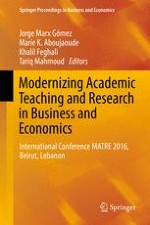2017 | Buch
Modernizing Academic Teaching and Research in Business and Economics
International Conference MATRE 2016, Beirut, Lebanon
herausgegeben von: Jorge Marx Gómez, Marie K. Aboujaoude, Khalil Feghali, Tariq Mahmoud
Verlag: Springer International Publishing
Buchreihe : Springer Proceedings in Business and Economics
